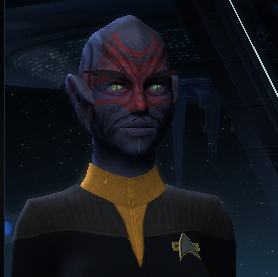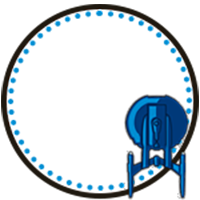The astrometrics lab had felt as raucous as when a dozen Klingons descended upon it. Packed in with the mathematicians, physicists, and astrometricists of the Advanced Science, Technology and Research Activity, the eclectic bunch discussed the aberrant aperture, both in terms of the baseline mechanics and the current attempts to slow its growth.
“Your modern warp drives are impressive for the superluminal velocity they put out,” offered General Golroth, the Klingon commander in charge of the battle group that had arrived out of nowhere just hours earlier. “I’ve long called on my colleagues to incorporate the advances we’ve learned from our partnership with the Federation, but alas, we are too proud to accept the innovations of others.” And, General Golroth thought to himself, with the Empire’s current obsession towards honor through combat, it had lost any edge it once had with innovations of its own.
Dr. Lockwood wasn’t sure what surprised him more: was it the brutish oaf’s use of the phrase ‘superluminal velocity’ or the general’s criticism of his own people? None of it was what he expected from a Klingon warlord, but admittedly, he had little to draw on. It wasn’t as though he’d spent much time, or really any at all, with Klingons. They did not typically frequent the academic halls that Luke Lockwood called home.
“But while impressive for travel,” the General continued. “No matter how much you tinker, your warp assembly will never generate a sufficient negative energy density field to overwhelm the potentiation from the compressed foliations of subspace on the other side of that aperture.”
He wasn’t wrong, Dr. Lockwood knew, but how had the Klingon realized it so quickly? Was it just a bold conjecture? Or had the General actually grasped the finer points of their reconfigured warp manifold and the Underspace-rooted aperture? The latter seemed unlikely.
“The General is too generous,” chortled another of the Klingons, a man who’d introduced himself as Voragh of the Science Institute of Mempa V. “You’re being small-minded, taking the science you know and applying it to what you don’t. If that’s all you’re willing to do, why even bother? Might as well just let the planet fall into the sun.” He folded his arms across his burly chest as if to accentuate his point.
“What would you suggest then?” Dr. Lockwood was all for constructive scientific debate, for that was how breakthroughs were made, but if the supposed scientist was just here to criticize their work, Dr. Lockwood had no issue going straight to Admiral Reyes and demanding she get the savages out of his lab. He wasn’t a babysitter, nor a school teacher, and he had an impossibly hard problem to solve here, one stitched into the fabric of spacetime itself. He still didn’t understand why the Klingons were even here.
“Tetryons,” Voragh stated without elaboration, as if it was self-evident.
“What about them?” Dr. Lockwood furled his brow skeptically. They’d already toyed with such ideas, but even Ensign Vok couldn’t make the math work, not without spelling doom for Vespara, and that had led them to settle on Dr. al-Qadir’s approach instead.
“A subspace phase inverter could shift the phase of the tetryon waves to generate destructive interference against the gravimetric gradient,” Voragh offered as he walked over to a console and deftly drew up a series of metric tensors to demonstrate his point. “The tetryon field is also being potentiated by the Underspace manifold, and if inverted, the negative energy density field would be more than sufficient to nullify the graviton radiation.”
“At first glance, sure,” Dr. Lockwood nodded as he walked over to the console where Voragh had set up. Although the Klingon had nearly half a meter and a hundred kilos of him, he gestured for the man to step aside. “But it only works in an idealized model.” As Voragh yielded the controls, Dr. Lockwood introduced a stochastic perturbation into the waveform. “With even minor variation in frequency, instead of destructive interference, it becomes constructive.” Dr. Lockwood hit play on the simulation again, and this time, rather than nullifying gravitation, it caused a repulsive energy wave that rippled across the system. “Mess it up even a little, and you’ll bring an early end to Vespara Prime.”
“Don’t mess it up then.”
“We don’t even have the means…”
“We do, my friend,” General Golroth explained as he walked over to the pair and set his large, muscular hand upon the shoulder of the lanky astrophysicist. “We do. We brought with us, fresh from Mempa V, subspace field generators, coils, stabilizers, and a control system with the resolution necessary to not, as you say, bring an end to your planet.”
Dr. Lockwood tilted his head as he stared at the Klingon with surprise. Mempa V wasn’t close enough for them to have simply swung by en route, and beyond that, how did they even know what they would face when they arrived? It wasn’t as though the mechanics of this Underspace aperture were general knowledge. It had taken them the better part of a week to figure it out, and it wasn’t as though they had broadcast their findings on open channels across the sector.
“Bold problems require bold thinking,” General Golroth continued. “You’re a small man who thinks too small, but that’s why you have us.”
If they were wrong, the consequences would be catastrophic. Dr. Lockwood thought back to the soliton experiments of the 2360s that had almost destroyed Lemma II, the ones on which he’d based his dissertation. This would be similar, but without a means to stop the wave that might radiate out from the singularity. However, if the Klingons were right, it could save the planet. That meant it was at least worth entertaining.
“Work with Ensign Vok,” Dr. Lockwood offered up the Saurian subspace theorist who’d already put several cycles into tetryon-based concepts for remediation. “Prove the resilience of this approach, that you won’t accidentally destroy Vespara Prime, and if it checks out, we’ll take it to the Admiral.”
“I can work with that.”
“And send me the specifications related to the phase inverter as well,” Dr. Lockwood added. “I’m not familiar with your technology, and if we’re going to put our faith in it, I’d like a chance to review it.” He wanted their Research Fellow in xenotechnology to review it too, but he knew better than to bring the Romulan into a room of Klingons.
“Certainly.”
It was almost too easy, Dr. Lockwood thought to himself. The Klingons had shown up with an exact solution to their problem, and they weren’t even putting up any resistance to sharing what would be, the astrophysicist suspected, highly classified technology. What was their angle? Why were they so willing to help?

 Bravo Fleet
Bravo Fleet















